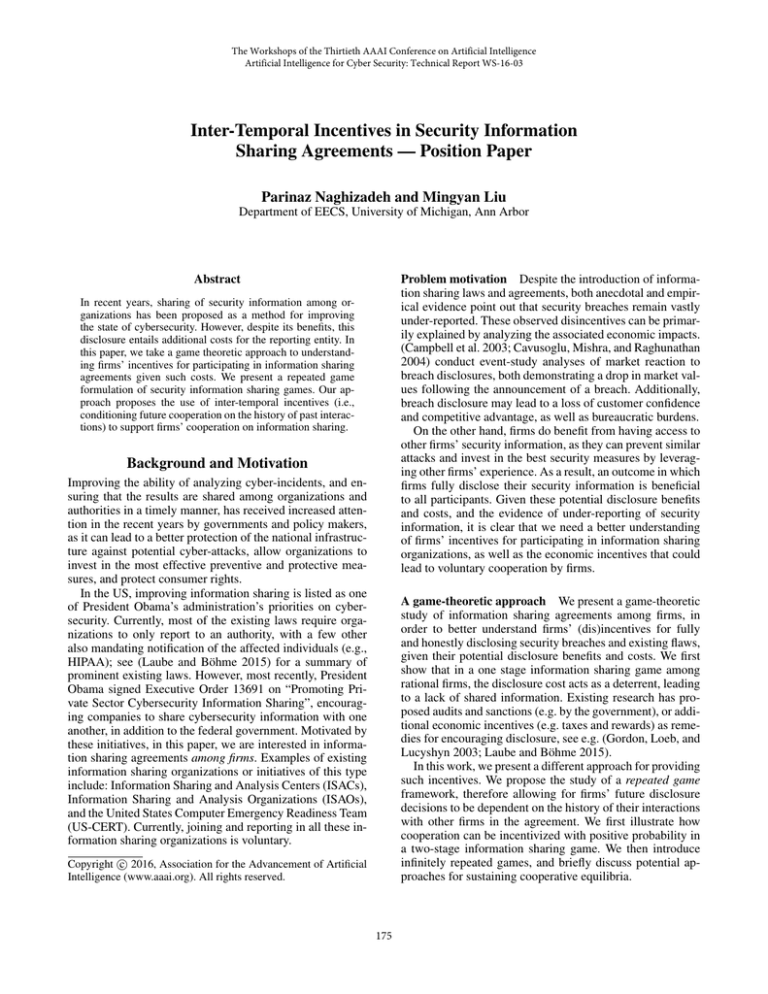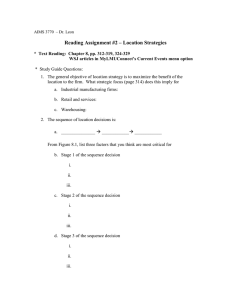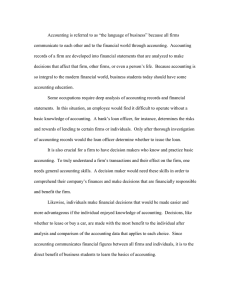
The Workshops of the Thirtieth AAAI Conference on Artificial Intelligence
Artificial Intelligence for Cyber Security: Technical Report WS-16-03
Inter-Temporal Incentives in Security Information
Sharing Agreements — Position Paper
Parinaz Naghizadeh and Mingyan Liu
Department of EECS, University of Michigan, Ann Arbor
Abstract
Problem motivation Despite the introduction of information sharing laws and agreements, both anecdotal and empirical evidence point out that security breaches remain vastly
under-reported. These observed disincentives can be primarily explained by analyzing the associated economic impacts.
(Campbell et al. 2003; Cavusoglu, Mishra, and Raghunathan
2004) conduct event-study analyses of market reaction to
breach disclosures, both demonstrating a drop in market values following the announcement of a breach. Additionally,
breach disclosure may lead to a loss of customer confidence
and competitive advantage, as well as bureaucratic burdens.
On the other hand, firms do benefit from having access to
other firms’ security information, as they can prevent similar
attacks and invest in the best security measures by leveraging other firms’ experience. As a result, an outcome in which
firms fully disclose their security information is beneficial
to all participants. Given these potential disclosure benefits
and costs, and the evidence of under-reporting of security
information, it is clear that we need a better understanding
of firms’ incentives for participating in information sharing
organizations, as well as the economic incentives that could
lead to voluntary cooperation by firms.
In recent years, sharing of security information among organizations has been proposed as a method for improving
the state of cybersecurity. However, despite its benefits, this
disclosure entails additional costs for the reporting entity. In
this paper, we take a game theoretic approach to understanding firms’ incentives for participating in information sharing
agreements given such costs. We present a repeated game
formulation of security information sharing games. Our approach proposes the use of inter-temporal incentives (i.e.,
conditioning future cooperation on the history of past interactions) to support firms’ cooperation on information sharing.
Background and Motivation
Improving the ability of analyzing cyber-incidents, and ensuring that the results are shared among organizations and
authorities in a timely manner, has received increased attention in the recent years by governments and policy makers,
as it can lead to a better protection of the national infrastructure against potential cyber-attacks, allow organizations to
invest in the most effective preventive and protective measures, and protect consumer rights.
In the US, improving information sharing is listed as one
of President Obama’s administration’s priorities on cybersecurity. Currently, most of the existing laws require organizations to only report to an authority, with a few other
also mandating notification of the affected individuals (e.g.,
HIPAA); see (Laube and Böhme 2015) for a summary of
prominent existing laws. However, most recently, President
Obama signed Executive Order 13691 on “Promoting Private Sector Cybersecurity Information Sharing”, encouraging companies to share cybersecurity information with one
another, in addition to the federal government. Motivated by
these initiatives, in this paper, we are interested in information sharing agreements among firms. Examples of existing
information sharing organizations or initiatives of this type
include: Information Sharing and Analysis Centers (ISACs),
Information Sharing and Analysis Organizations (ISAOs),
and the United States Computer Emergency Readiness Team
(US-CERT). Currently, joining and reporting in all these information sharing organizations is voluntary.
A game-theoretic approach We present a game-theoretic
study of information sharing agreements among firms, in
order to better understand firms’ (dis)incentives for fully
and honestly disclosing security breaches and existing flaws,
given their potential disclosure benefits and costs. We first
show that in a one stage information sharing game among
rational firms, the disclosure cost acts as a deterrent, leading
to a lack of shared information. Existing research has proposed audits and sanctions (e.g. by the government), or additional economic incentives (e.g. taxes and rewards) as remedies for encouraging disclosure, see e.g. (Gordon, Loeb, and
Lucyshyn 2003; Laube and Böhme 2015).
In this work, we present a different approach for providing
such incentives. We propose the study of a repeated game
framework, therefore allowing for firms’ future disclosure
decisions to be dependent on the history of their interactions
with other firms in the agreement. We first illustrate how
cooperation can be incentivized with positive probability in
a two-stage information sharing game. We then introduce
infinitely repeated games, and briefly discuss potential approaches for sustaining cooperative equilibria.
c 2016, Association for the Advancement of Artificial
Copyright Intelligence (www.aaai.org). All rights reserved.
175
1
0
1
G − L, G − L
G, −L
0
−L, G
0, 0
Table 1: Info. sharing game
G
B
G
h,h
0,0
B
0,0
`,`
suppose in the first period, firm i plays ri = 1 with probability β, and ri = 0 otherwise. In the second period, this
firm will play H if and only if she has played ri = 1 in
the first period, and she has a belief bi = 1 about firm j.
It is possible to solve the equilibrium conditions to find a
β > 0 as a function of the monitoring parameters α and .
Therefore, inter-temporal incentives lead to full disclosure
(ri = 1, rj = 1) emerging with positive probability.
Table 2: Partnerships
The information sharing game
Consider two firms who have agreed to share their security information through an information sharing agreement.
Nevertheless, each firm has a choice as to whether (fully and
honestly) disclose her information. We denote the decision
of firm i by ri ∈ {0, 1}, indicating (partially) concealing and
(fully) disclosing, respectively. A choice of ri = 1 results in
disclosure costs L > 0 for firm i. We assume this choice
benefits the other firm j by helping her improve her state
of security, yielding an information gain G > 0 for firm j.
Assume G > L. The payoff matrix of the information sharing game among the firms is given in Table 1. This game
is therefore an instance of the prisoner’s dilemma: the only
Nash equilibrium of the one stage game is for neither firm
to disclose her security information. However, a repeated
game formulation can leverage firms’ interest in maintaining a good reputation in the future to sustain cooperation
among participants.
The infinitely repeated game Next, consider the stage
game of Table 1 repeated infinitely. A longer history of play
can allow for more elaborate strategies; e.g., non-disclosure
periods that start after a certain number of suspected deviations, or that last only for a certain number of rounds.
Therefore, one may expect the possibility of supporting cooperation with similar (or better) results, compared to the
two-stage game, by considering longer lasting interactions.
(Compte 2002) shows a negative result in this game
when trigger strategies are used: even if firms’ signals about
others’ actions are highly informative, full cooperation on
information disclosure can not be supported. There exist, however, alternative approaches that may help support
(some) cooperation, including: allowing firms to communicate (cheap talk) (Compte 1998), availability of public actions (e.g., announcing sanctions) in addition to (private)
disclosure decisions (Park 2011), or almost public monitoring, i.e., independent private monitoring with signals that are
sufficiently correlated (Mailath and Samuelson 2006). A detailed analysis of these approaches, and their implications on
the role of authorities as facilitators of public monitoring or
communication, is the main direction of future work.
A two stage game First, consider a two-stage interaction
among the firms, with first and second stage payoffs given by
Tables 1 and 2, respectively. The second stage game captures
decisions on a subsequent business partnership, with G (B)
denoting a high (low) profit partnership, where h > ` > 0.
To condition future behavior on past actions, we assume
each firm can only imperfectly assess the honesty and comprehensiveness of the other’s report. In particular, following
the first stage, firm i forms a belief bi about firm j’s report,
by monitoring firm j’s externally observed security posture.
We let bi = 1 indicate a belief of full disclosure, and bi = 0
otherwise. We assume the belief bi of firm i is imperfect,
private, and independent of firm j’s belief bj about firm i.
Formally, we assume the distribution:
,
1 − ,
πi (bi |rj ) =
α,
1 − α,
for bi
for bi
for bi
for bi
= 0, rj
= 1, rj
= 0, rj
= 1, rj
Acknowledgments
This work is supported by the Department of Homeland Security (DHS) via contract number HSHQDC-13-C-B0015.
References
Campbell, K.; Gordon, L. A.; Loeb, M. P.; and Zhou, L. 2003.
The economic cost of publicly announced information security
breaches: empirical evidence from the stock market. Journal of
Computer Security.
Cavusoglu, H.; Mishra, B.; and Raghunathan, S. 2004. The effect of internet security breach announcements on market value:
Capital market reactions for breached firms and internet security
developers. Int. Journal of Elec. Commerce.
Compte, O. 1998. Communication in repeated games with imperfect private monitoring. Econometrica 597–626.
Compte, O. 2002. On failing to cooperate when monitoring is
private. Journal of Economic Theory 102(1):151–188.
Gordon, L. A.; Loeb, M. P.; and Lucyshyn, W. 2003. Sharing
information on computer systems security: An economic analysis.
Journal of Accounting and Public Policy.
Laube, S., and Böhme, R. 2015. The economics of mandatory
security breach reporting to authorities. In Workshop on the economics of information security (WEIS).
Mailath, G. J., and Samuelson, L. 2006. Repeated games and
reputations, volume 2. Oxford university press Oxford.
Park, J. 2011. Enforcing international trade agreements with imperfect private monitoring. The Rev. of Econ. Studies.
=1
=1
=0
=0
with ∈ (0, 1/2) modeling missed detection by firm j, and
α ∈ (0, 1) as the accuracy of firm i’s monitoring technology.
Pure strategy and mixed equilibria Ideally, we would
like to identify a pure strategy equilibrium that supports
(ri , rj ) = (1, 1) in the first period, by conditioning the second stage partnership on the first stage decisions. Nevertheless, it can be shown that (Mailath and Samuelson 2006),
as firm i’s belief about firm j’s action in the second period
is independent of i’s observed signal, it is not sequentially
rational for firm i to consider her signal in the second period. Therefore, with pure strategies, inter-temporal incentives can not be used to coordinate on (ri , rj ) = (1, 1).
We next consider an alternative strategy profile in which
firms randomize their actions in the first period. Formally,
176







